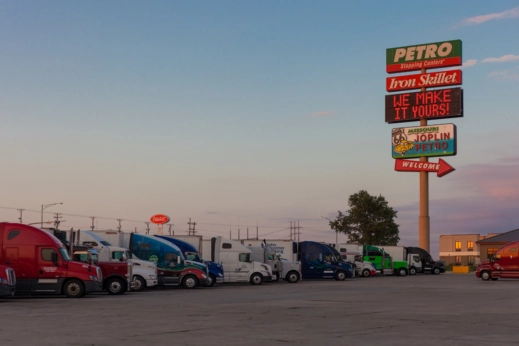[ad_1]
When you’ve eaten at this time, you’ll be able to thank a trucker. A lot of the meals we eat on this nation, and most different issues as properly, are transported by vehicles—as a lot as 70 p.c of the worth of all business items shipped within the US. And whereas the common American won’t assume an excessive amount of about long-haul truckers of their day-to-day life, perhaps we must always. Not solely is that this an trade that we rely on critically, it’s one that’s going by one thing of a metamorphosis.
Efficient January 1, 2024, intrastate vehicles in California should be geared up with Digital Logging Gadgets (ELDs), following within the steps of different states which have made comparable mandates. Vehicles making interstate deliveries have been required to be geared up with ELDs since 2017.
ELDs are small units, however the influence they’ve had on the trucking trade is monumental. Monitoring units that monitor when the truck is in movement and for what length, ELDs are largely supposed to deal with highway issues of safety related to drivers pushing themselves too far for too lengthy. However some say ELDs are having the alternative impact and are a violation of trucker privateness and workflow.
“It simply looks as if the trucking trade is getting regulated out of existence,” wrote one trucker, Allen Boyd, in response to a request for feedback on ELD regulation updates by the Federal Motor Provider Security Administration (FMCSA) in 2022.
Why ELDs?
Lengthy-haul trucking was once a safe and revered profession. At this time, it’s a job with excessive turnover and a scarcity of safety. Many headlines at this time discuss the way forward for trucking, which incorporates the potential of autonomous fleets changing human-driven ones sooner or later down the road. However the predicament by which truckers discover themselves now truly goes again in time by a number of a long time.
The Honest Labor Requirements Act, which created a assured minimal wage, handed in 1938. An exemption was included for truckers, so they might earn extra and be extra productive. However, in 1980, when the Motor Provider Act was handed, truckers for the primary time encountered Hours of Service guidelines, capping what number of hours they have been allowed to be on the job. Whereas it is a fairly normal labor regulation, the truth that truckers nonetheless didn’t have a minimal wage created the difficulty because it stands at this time: Many truckers are paid by the mile, however they’re restricted in what number of hours they will work. To earn a snug wage means there’s an implied and incentivized race in opposition to the clock. This, after all, is a harmful mixture on the open highway.
ELDs are hooked up to the engine and may set very agency boundaries on how lengthy the truck will be in operation and when it’s time for a mandated break. The FMCSA estimates that ELDs will result in 1,844 fewer crashes and 26 prevented deaths yearly.
The difficulty, says Karen Levy, PhD, affiliate professor within the Division of Info Science at Cornell College and creator of Information Pushed: Truckers, Know-how, and the New Office Surveillance, is that ELDs don’t deal with what she believes is the precise root reason behind fatigue-related crashes or unsafe driving.
In response to Levy, these issues will be traced again to the usual pay construction for long-haul truckers, which is compensation for miles pushed. There’s a standard saying within the trucking trade, “If the wheels ain’t turning, you ain’t incomes.” The difficulty with that is that there are duties inherent to the job—getting gasoline, loading the truck, unloading the truck—that happen when the truck is stationary. Because the saying implies, cash isn’t earned throughout these durations, even when they take hours. This will incentivize driving longer with out breaks than is protected.
“One of many issues that has actually been hanging to me is it could’t actually be overstated how essentially dependent we’re on this method that hardly works,” says Levy.

A truck dashboard with an ELD display. (Photograph: Shutterstock)
Not solely do ELDs not resolve the issue, says Levy, they might even make it worse. Agency constraints on driving time, whereas the pay construction stays based mostly on distance traveled, signifies that drivers are implicitly inspired to drive quicker and extra recklessly to maximise their mileage throughout the allotted time.
“We haven’t modified the financial construction of the trade or the principles,” says Levy. “All we modified is how they’re monitored.”
It’s solely been a couple of years for the reason that 2017 mandate, however one research suggests that accident charges haven’t gotten higher but and may need even gotten worse.
One of many causes for this, says Levy, is that it takes the pliability out of the work. She offers a hypothetical:
Earlier than, in case you had 11 hours to get someplace, and it takes you 11 hours and 10 minutes, it’s not a giant deal. That’s simply a part of being on the highway.
However, with an ELD, in case you have 11 hours to get someplace and taking a minute over would put you in violation, you would possibly deal with that drive in another way.
“You’re most likely going to drive far more recklessly, a lot quicker, you’re not going to take the time to go get a cup of espresso in case you really feel such as you want it,” says Levy. “You’re not going to cease and examine on one thing that sounds bizarre in your truck.”
And, on the finish of the allotted drive time, the trucker won’t be wherever close to a spot they will pull over to relaxation. In the event that they drive additional on the lookout for a truck cease, they threat being in violation. In response to a request for feedback on ELD regulation updates by the FMCSA in 2022, an nameless trucker voiced their concern.
“In my sincere opinion since ELD there was extra accidents as a result of drivers are all the time being compelled to race the clock to allow them to get loaded/unloaded and to [the] subsequent pickup or protected spot to sleep for the evening as a result of they’re out of hours.”
One other commenter agreed, saying that the ELDs make it more durable for drivers to take breaks after they want them. And in the event that they hit site visitors, development or unreliable highway situations, the motive force loses miles and hours.
“We preserve getting instructed that these legal guidelines, [these] guidelines are put in place to make it simpler and safer for the motive force. In doing so, it makes it more durable.”
The highway forward
There’s a path ahead, says Levy, but it surely’s bought to transcend simply know-how. “I don’t assume there’s a tweak we might make to the ELD that may resolve all of the truckers’ issues,” says Levy. Safer roads most likely require an strategy that focuses extra on trucker pay and labor rights. Trevor Ralphs, in a remark response to the FMCSA immediate, echoed Levy’s level about trucker pay construction.
“When you actually need to make driving extra protected for not solely truck drivers however everybody else on the highway, you’d make it in order that truck drivers are all paid hourly. This could be sure that truck drivers will not be in a rush to take advantage of cash however as an alternative they’re taking issues sluggish, regular and protected as a result of you may be paid extra in your time.”

Vehicles at a truck cease in Missouri. (Photograph: Shutterstock)
Whereas the trade pay rules haven’t modified, some firms have began shifting towards time-based pay within the ELD period. Nathaniel Hosea writes in response to the FMCSA immediate:
“I personally like ELDs as an organization driver, it retains all the things organized and I get a[n] hourly pa[y] now. Earlier than ELDs, I bought paid CPM [cents per mile] and misplaced numerous cash ready time in stopped site visitors and never being paid at warehouses. Lastly, with ELDs and hourly pay, I don’t need to be pressured to hurry and driving unsafe to ship masses.”
Hosea goes on to say that driving per mile must be a factor of the previous. “There must be a legislation to finish CPM [cents per mile] wage funds, site visitors is simply too congested at this time to make any cash on CPM.”
We should always take away the trucker exemption from the Honest Labor Requirements Act, in order that truckers will be paid extra pretty, says Levy.
“I feel, essentially, the issues within the trade are political and financial,” says Levy. “Truckers don’t have the political energy to efficiently argue for labor rights that may actually make us all safer.”
Extra broadly, says Levy, there’s been a cultural shift from seeing truckers because the heroes of the freeway to seeing them as on the fringes of society. However, on the finish of the day, our nation—and our meals system—wouldn’t operate with out long-haul truckers and the work that they do.
“Constructing dignity again into the job,” says Levy—not barring them from utilizing enterprise bogs or filming them continually—“these are good locations to begin.”
***
Thinking about studying extra about this matter?
Yow will discover Levy’s e book right here: https://press.princeton.edu/books/hardcover/9780691175300/data-driven
Truckers are paid just a little in another way than most different professions. A breakdown of why will be present in this text from FleetOwner. For an extended historical past of the trucking trade, try this podcast known as On the Transfer.
[ad_2]
Source link









